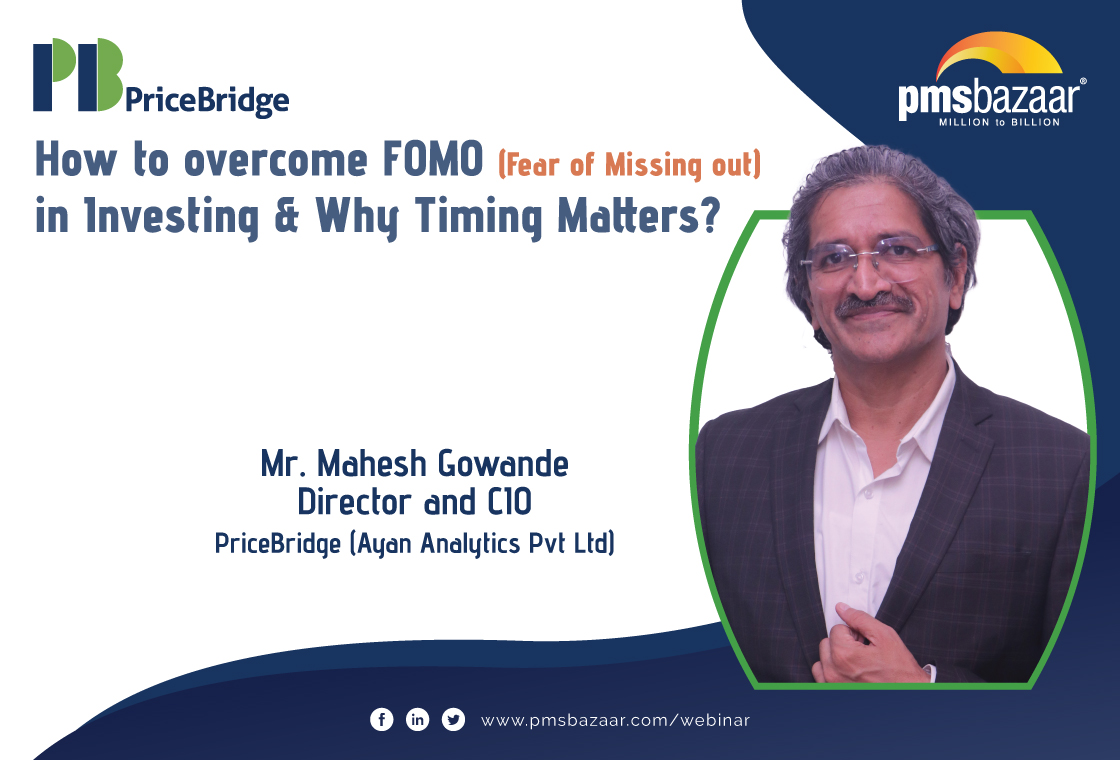The gold standard of measuring an investment's success is alpha i.e the extent of out-performance over the benchmark return over a period. This logic makes a lot of sense. Investors pay fees to the investment manager to out-perform i.e. get bang for the buck. After looking at the data for the last 1 year, 3 years, 5 years and 10 years, we have conclusive proof that PMS is a good vessel to generate alpha and they also beat MF equity funds. Read on to know why we are saying this.

For investors with a sizable amount of money at their disposal, it has always made sense to add Portfolio Management Services (PMS) to their investment bucket. PMSes offer customized investment solutions, transparency, competitive pricing and much more. But be it a car or an investment product, the all-important customer question before buying is: "Kitna Deta Hai?" Yes, returns matter.
The gold standard of measuring an investment's success is alpha i.e the extent of out-performance over the benchmark return over a period. This logic makes a lot of sense. Investors pay fees to the investment manager to out-perform i.e. get bang for the buck.
We at PMSBazaar wanted to find how many PMS strategies generate alpha and also how do they stack up against mutual funds, often touted as the low-cost way to create wealth. After looking at the data for the last 1 year, 3 years, 5 years and 10 years, we have conclusive proof that PMS is a good vessel to generate alpha and they also beat MF equity funds.
Study construct
For an apple-to-apple comparison, it is important to be fair to mutual funds. Thus, we took out data for 1, 3, 5 and 10 year point to point returns ended May 2020 for PMSes, Mutual Funds and their respective benchmarks (considered TRI - Total Return Index for both MFs and PMSes). In the case of PMS, we considered post-fees return data from the PMS Bazaar universe, 133 strategies in 1 year, 81 strategies in 3 year, 49 strategies in 5 year and 25 strategies in 10 year periods respectively.
AMFI on its website has total performance data of 401 growth/equity schemes. In 1 year period, we considered data of 401 MF schemes, in 3 year period we looked at 294 MF schemes, in 5 year period we looked at 253 MF schemes and in 10 year period we looked at 201 MF schemes. Note we used regular plan MF data for returns.

1 year period findings
While we admit 12 months may be too short a time to evaluate alpha, morning sometimes shows the day.
 In the short term i.e. 1 year, PMS strategies showed strong out-performance vis-a-vis their respective benchmarks with as many as 91 of 133 generating more than 1% point alpha (the cut-off). This means roughly 69% of PMSes beat their benchmark. This is a good ratio of winners. The last 1 year has been a trying time for the equity market, with most diversified benchmarks down in double-digit percentages.
In the short term i.e. 1 year, PMS strategies showed strong out-performance vis-a-vis their respective benchmarks with as many as 91 of 133 generating more than 1% point alpha (the cut-off). This means roughly 69% of PMSes beat their benchmark. This is a good ratio of winners. The last 1 year has been a trying time for the equity market, with most diversified benchmarks down in double-digit percentages.
Everybody can't win. Where there are winners, there are some laggards too. 35 of 133 PMSes failed to convincingly beat their benchmark, which is basically over 26% of the total pool. 7 PMSes (5%) in the 1 year period were at par with their respective benchmark (-1% to +1%), some relief for their fund managers.
In comparison, mutual funds did not seem to show PMS-like strong out-performance credentials. In the 1 year period, only about 53% of 401 MFs beat their respective indices, about 35% under-performed and nearly 12% came up with at par performance.
Losing less is winning more. Round 1 goes to PMS for delivering superior share of out-performers compared to mutual fund peers especially during the bearish phase.
3 year findings
It is often said that sometimes we need to talk to a 3-year old so we can understand life again. In the last 3-year period ended May 2020, large caps have been largely flat while the midcap and smallcaps are still down.

The number of out-performers dipped in the 3 year period for PMS strategies compared to the 1 year period. 28 of 81 strategies beat respective benchmarks, which is about 35% of the total pool. Clearly, the going got tough. Naturally, the share of laggards was high at 39 of 81 strategies (48%). Also, 17% of the PMSes in the 3 year period managed to display at-par performance.
But if you thought mutual funds would take the cake from PMSes, you would be disappointed. Only 1 out of every 4 (25.5%) of mutual funds out-shined their respective benchmarks in the 3 year period, more than half (51.7%) struggled compared to their target indices, while nearly 22.8% of 294 mutual funds barely scraped through with at-par show. It was only in February 2018 that MFs started benchmarking themselves to the TRI of indices and target practice in initial days proved tough.
The lead in favour of PMSes in Round 1 only grew in Round 2. Remember that stock movement during the last 3 year period has been highly concentrated, and it was pretty common to miss them if managers followed a close-to-index strategy.
5 year findings
Half a decade is quite some time. "Where do you see yourself in 5 years" is a standard HR-round question at many interviews. PMS fund managers would be happy with what they have accomplished in the 5 year time period.

The number of out-performers inched up in the 5 year period for PMSes compared to 3 years. As many as 20 of the 49 strategies trounced their benchmark in this period; that is about 41% of the total pool. About 19 PMSes were laggards i.e. nearly 39%. About 20% of 49 PMSes -- 10 clocked at par performance, which we define as -1% to +1% to respective benchmark.
Mutual funds struggled to beat PMSes yet again. Just about 29% of 253 MF schemes were out-performers, more than 46% under-achieved compared to target benchmark and nearly 25% (1 in 4) were sitting with at-par performance.
With one more round left, PMS clearly cemented its place as superior alpha generator compared to MFs. Having seen the ups and downs in the 5 years --- 2016 and 2018 were quiet years while 2017 and 2019 saw good equity performance -- PMSes did not buckle under pressure.
10 year findings
Looking at the 10 year returns, it can be easily said that PMS burnished its reputation. There were regulatory changes, the market chose new leaders and much more. Yet, PMSes stuck to their agenda of delivering alpha.

As high as 21 of the 25 PMSes (84%) outpaced their respective benchmarks. This only goes to show that being really long-term pays off. The good news doesn't end there. None of the PMSes were under-performers. Just 4 PMSes (16%) delivered at-par performance with Mr. Market.
Mutual funds lagged PMSes even in the 10-year period. About 46% of the 201 MF schemes outmatched the respective benchmark indices, a reasonable number but not enough to beat the high bar set by PMSes. Close to 23% of mutual funds struggled against their benchmark while a record 30.85% of MFs just managed to give at-par performance.
Conclusion
Life is not 'either or', it can be 'both and'. Many investors and advisors pitch PMS versus MF. It need not be like that. Our wide-ranging performance study shows how PMS deserves a place in the investment portfolio of discerning investors. While mutual funds are good in their own right given with about 3 decade long popularity among the investors and well practiced transactions, PMSes, gaining popularity only recently, deliver superior returns with dynamic and active management along with high degree of flexibility that many wealthy investors desire.
Recent Blogs

5 Key Considerations Before Investing in AIFs in India
Alternative Investment Funds (AIFs) have emerged as a compelling option for sophisticated investors seeking diversification and potentially superior returns. But venturing into AIFs requires a clear understanding of their unique characteristics that go beyond simply knowing what they are and their categories.

How AIF can help in diversification?
Traditionally, Indian investors have relied on a mix of stocks and bonds to build their wealth. While this approach offers diversification, it can still leave your portfolio vulnerable to market fluctuations. Enter Alternative Investment Funds (AIFs), a dynamic asset class gaining traction for its ability to unlock diversification beyond the realm of conventional options.

Long-Short AIFs Outperform Again Even as Markets Rebound in September
104 long-only funds shows an average monthly gain of just 0.37 per cent, while long-short AIF category averaged 0.94 per cent

Resilience returns as markets rebound in September; Multi-asset PMSes lead pack
Over 63% of equity PMSes ended September in green; nearly two-thirds outperformed key benchmarks.

Stories Fade, Numbers Last: Trends vs Fundamentals
This article is authored by CA Rishi Agarwal, Co-founder & Fund Manager, Aarth Growth Fund

Auto-Adaptive Strategies for a Rapidly Changing Market
PMS Bazaar recently organized a webinar titled “Auto-Adaptive Strategies for a Rapidly Changing Market,” which featured Mr. Alok Agarwal, Head - Quant and Fund Manager, Alchemy Capital Management.

How to overcome FOMO (Fear of Missing out) in Investing and Why Timing Matters?
PMS Bazaar recently organized a webinar titled “How to overcome FOMO (Fear of Missing out) in Investing and Why Timing Matters?” which featured Mr. Mahesh Gowande, Director and CIO, PriceBridge (Ayan Analytics Pvt. Ltd).

Reigniting India’s Consumption Engine
This article is authored by Ashish Chaturmohta, Managing Director, APEX PMS, JM Financial Ltd.

